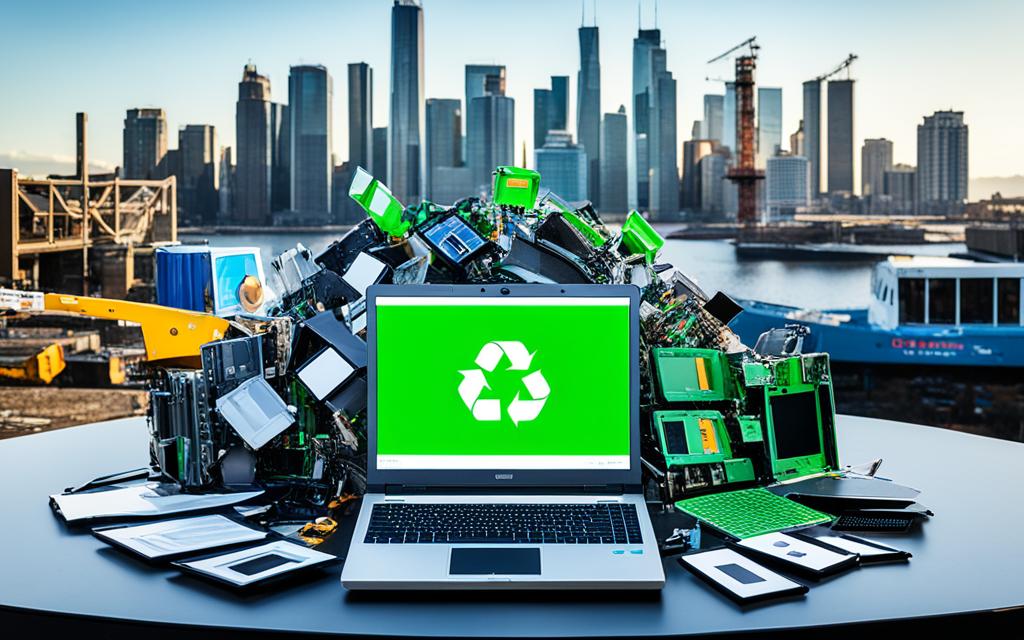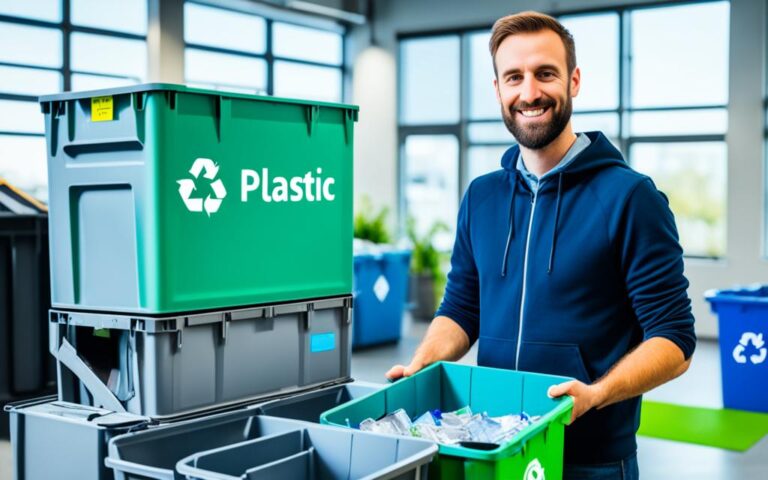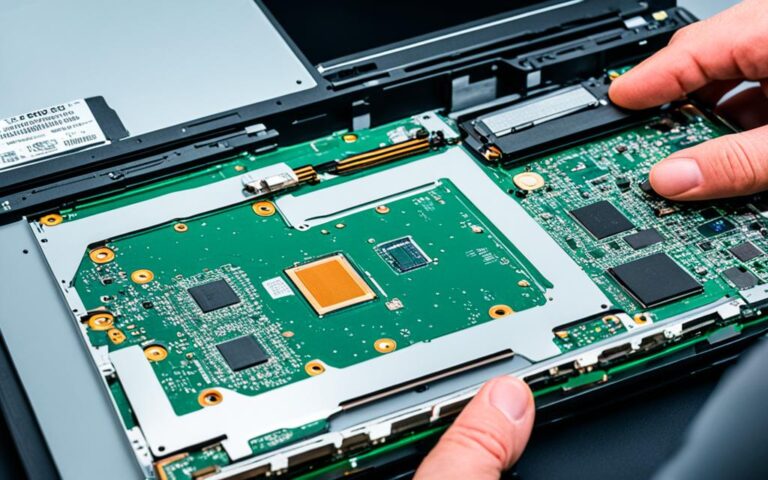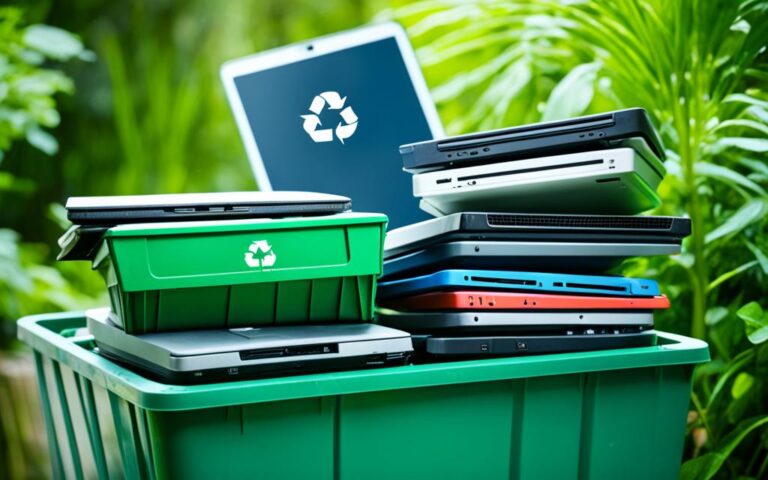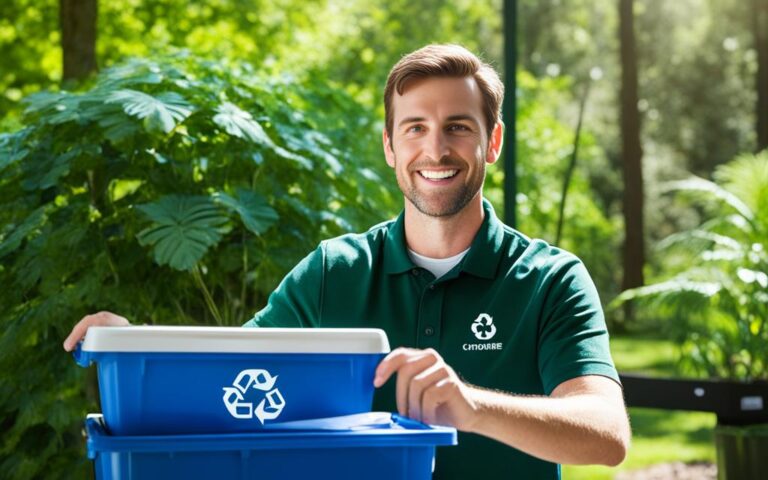The Importance of Laptop Recycling in the Age of Rapid Technological Change
As technology trends continue to change at a rapid pace, the accumulation of e-waste is growing exponentially. It is crucial to recycle old technology, such as laptops, to mitigate the environmental impact of e-waste and ensure a sustainable future. Recycling old laptops not only helps reduce e-waste but also offers several benefits, including protecting the environment, saving money, reducing energy consumption, and creating job opportunities. With the continuous advancement of technology, laptop recycling plays a pivotal role in managing e-waste in the UK and contributing to a greener planet.
In today’s digital age, the rate at which technology changes is astonishing. New laptop models with enhanced features and improved performance are introduced to the market regularly. As a result, many individuals and businesses upgrade their laptops frequently, leading to the disposal of the older devices. Unfortunately, this increased disposal of laptops contributes to the massive accumulation of electronic waste, commonly referred to as e-waste.
E-waste is a major environmental concern, posing significant challenges to waste management and sustainability efforts. The hazardous components present in laptops, such as toxic chemicals and heavy metals, can contaminate the environment if not disposed of properly. These harmful substances can leach into the soil, pollute water sources, and release harmful emissions into the air, posing risks to human health and biodiversity.
By recycling old laptops, we can significantly reduce the environmental impact of e-waste. When laptops are recycled, valuable materials like metals, plastics, and glass can be recovered and reused in the manufacturing of new products. This not only conserves natural resources but also reduces the need for energy-intensive mining and manufacturing processes.
Laptop recycling also plays a crucial role in conserving energy. The production of new laptops requires a significant amount of energy, from extracting raw materials to the manufacturing process. By recycling laptops, we can significantly reduce the energy consumption associated with producing new devices.
Moreover, laptop recycling offers financial benefits. Many IT recycling companies offer free pickup services for old laptops, saving individuals money on waste management costs. Additionally, the refurbished laptops that are recovered through recycling can be sold at lower prices, providing affordable options for those who cannot afford brand new devices.
Furthermore, laptop recycling contributes to job creation and economic growth. The recycling industry employs thousands of individuals across the UK, from collection and sorting to refurbishment and resale. By supporting laptop recycling initiatives, we can contribute to the creation of sustainable, green jobs and stimulate the economy.
Overall, laptop recycling is an essential practice in the age of rapid technological change. By recycling old laptops, we can protect the environment, conserve resources, save money, reduce energy consumption, and create job opportunities. It is our collective responsibility to make sustainable choices and contribute to a greener future. Through laptop recycling, we can actively manage e-waste and work towards a more sustainable and environmentally friendly society.
Why Recycle Old Technology?
Recycling old technology is crucial for several reasons. First, as technology isn’t designed to last forever, recycling old laptops prevents them from ending up in landfills and contributing to environmental pollution. Second, proper recycling reduces waste in landfills and on our streets, leading to a greener environment. Third, recycling old technology helps in reducing greenhouse gas emissions by minimizing the need for raw materials in the production of new products. Lastly, recycling old laptops supports the creation of jobs in the recycling industry, contributing to the economy and reducing unemployment.
In a world of rapid technological advancement, it’s important to manage the disposal of our old technology responsibly. By recycling old laptops, we not only minimize waste but also contribute to a more sustainable future. Let’s take a closer look at the reasons why recycling old technology is so essential:
- Preventing Environmental Pollution: Recycling old laptops ensures that they don’t end up in landfills, where they can release harmful substances into the soil, water, and air. By diverting these devices from the waste stream, we can significantly reduce environmental pollution.
- Creating a Greener Environment: Proper recycling of old technology reduces the amount of waste in landfills and on our streets. This leads to cleaner surroundings and a healthier ecosystem for plants, animals, and humans alike.
- Reducing Greenhouse Gas Emissions: Recycling old technology minimizes the need for raw materials in the production of new products. This, in turn, helps in lowering greenhouse gas emissions and mitigating the impact of climate change.
- Supporting Job Creation: The recycling industry plays a vital role in creating job opportunities. When old laptops are recycled, valuable materials are recovered and used to manufacture new products. This process supports the growth of the recycling sector, contributing to the economy and reducing unemployment rates.
By recycling our old technology, we can make a positive impact on both the environment and the economy. It’s an essential step towards a more sustainable future.
The Journey of Recycled Technology:
| Stage | Description |
|---|---|
| Collection | Old laptops are collected from individuals, businesses, and educational institutions. |
| Sorting | The collected laptops are sorted based on their condition and potential for refurbishment or recycling. |
| Refurbishment | Laptops in working condition are refurbished to extend their lifespan and make them accessible to those in need. |
| Recycling | Laptops that cannot be refurbished are carefully dismantled, and their components are recycled. |
| Reuse of Materials | Recycled materials, such as plastics, metals, and glass, are used in the manufacturing of new products. |
| Manufacturing | New products, including laptops and other electronic devices, are manufactured using recycled materials. |
Recycling old technology is a complex process that involves various stages. From collection to manufacturing, each step contributes to the preservation of resources and the reduction of waste. By understanding this journey, we can better appreciate the importance of recycling in creating a sustainable and circular economy.
Benefits of Recycling Old Technology
When it comes to recycling old technology, especially laptops, there are numerous benefits that contribute to a cleaner environment and a more sustainable future.
1. Reduces e-waste accumulation: Recycling old technology helps to significantly reduce the amount of electronic waste that would otherwise end up in landfills, polluting the environment and posing risks to human health.
2. Cost-effective waste management: Many IT recycling companies offer free pickup services for old laptops, saving individuals money on waste management fees.
3. Combats climate change: Recycling old technology plays a vital role in reducing greenhouse gas emissions. By reusing recyclable materials, the production of new products requires less energy and resources, leading to a smaller carbon footprint.
4. Energy conservation: Recycling old laptops and other technology helps conserve energy by reusing valuable materials. This reduces the need for extracting and processing raw materials, which are often energy-intensive processes.
5. Prevents pollution of land, water, and air: Properly recycling old technology ensures that hazardous substances and pollutants do not contaminate the environment. This helps to maintain cleaner surroundings for both humans and wildlife.
By recycling old technology, we can make a significant impact on waste reduction, protecting the environment, and preserving valuable resources. Let’s take a moment to consider the potential benefits of recycling old technology.
| Benefits | Key Points |
|---|---|
| Reduces e-waste accumulation | Prevents pollution and health hazards |
| Cost-effective waste management | Saves money on waste disposal |
| Combats climate change | Reduces greenhouse gas emissions |
| Energy conservation | Reduces the need for raw materials and energy-intensive processes |
| Prevents pollution of land, water, and air | Maintains cleaner surroundings for everyone |
Recycling old technology is not only a responsible choice but also a beneficial one that positively impacts the environment and society as a whole. The next section will discuss various ways to dispose of old technology responsibly.
How to Dispose of Old Technology
When looking to dispose of old technology, you have several options available. It is essential to choose the right method to ensure responsible and environmentally friendly disposal. Here are some suggestions:
- Donate to Schools or Charity Organizations: If your electrical devices still work, consider donating them to schools or charity organizations. By doing so, you can extend the lifespan of the devices and provide someone else with a valuable resource.
- Sell to Local Resellers: Selling your old technology to local resellers is an excellent way to earn some extra money while ensuring that the devices are put to good use. This not only benefits you but also reduces waste and promotes a circular economy.
- Repair Instead of Throwing Away: Before discarding equipment that needs fixing, consider taking them to a nearby repair shop. Many issues can be resolved, allowing you to continue using your devices and minimizing unnecessary waste.
- Contact an Electronic Recycler: If none of the above options are viable for your old technology, reach out to a reputable electronic recycler. These organizations specialize in the responsible disposal of electronic waste and can ensure that your devices are recycled properly.
Remember, disposing of old technology responsibly is crucial for reducing e-waste and its impact on the environment. By choosing the right disposal method, you can contribute to a more sustainable future.
The Role of IT Recycling in Bridging the Digital Divide
IT recycling plays a crucial role in bridging the digital divide, which refers to the inequalities in accessing technology and the internet. By responsibly refurbishing, reusing, and recycling donated technologies, IT recycling organizations increase access to affordable technology, promoting digital inclusion and equal opportunities for all. This not only helps close the technology access gap but also contributes to sustainable e-waste management. Through IT recycling, old technology can be refurbished and provided to underserved communities, empowering individuals, enhancing educational outcomes, and strengthening economic development.
Digital Inclusion for All
IT recycling initiatives are instrumental in promoting digital inclusion by making technology more accessible to underserved populations. By refurbishing and donating recycled technology to schools, community centers, and low-income individuals, IT recycling organizations ensure that everyone has the opportunity to benefit from digital resources. Bridging the digital divide is essential in a modern society where access to technology and the internet is increasingly crucial for education, employment, and social participation.
“IT recycling organizations play a vital role in ensuring that technology is not a luxury but a right for everyone, regardless of their socio-economic status. By promoting digital inclusion, these initiatives empower individuals to engage with the digital world and unlock new opportunities for personal and professional growth.” – John Thompson, CEO of TechRecycle
Sustainable E-Waste Management
IT recycling not only addresses the issue of limited access to technology but also contributes to sustainable e-waste management. By recycling old technology, IT recycling organizations prevent electronic waste from ending up in landfills and polluting the environment. Recycling helps recover valuable materials and reduces the need for raw resource extraction, reducing the environmental impact of electronic waste disposal. This sustainable approach to e-waste management ensures that technology can be reused or repurposed, extending its lifecycle and minimizing waste.
| Benefits of IT Recycling in Bridging the Digital Divide | Benefits of IT Recycling for Sustainable E-Waste Management |
|---|---|
| Equal access to technology and the internet for all individuals | Reduces electronic waste in landfills |
| Promotes digital inclusion and equal opportunities | Recovers valuable materials for reuse |
| Enhances educational outcomes and economic development | Reduces the need for raw resource extraction |
By bridging the digital divide and ensuring sustainable e-waste management, IT recycling initiatives create a more equitable society while minimizing the environmental impact of electronic waste. Through responsible refurbishment and recycling practices, old technology can be given a new lease of life, benefiting underserved communities and contributing to a greener, more inclusive future.
The Importance of Proper E-Waste Recycling
Proper e-waste recycling is essential to mitigate the environmental and health hazards associated with electronic waste. The improper disposal of e-waste releases toxic substances into the soil, water, and air, contaminating the environment and posing a risk to human and animal health.
By recycling electronic devices, valuable materials can be recovered and reused, reducing the demand for raw materials and conserving energy. It also helps prevent the release of harmful emissions and pollutants during the disposal process.
“Proper e-waste recycling is not just a responsibility, but a necessity. It’s our duty to protect the planet and future generations from the harmful effects of improper e-waste disposal.”
By recycling old technology, we can contribute to a more sustainable and environmentally friendly society. Proper e-waste recycling not only safeguards our environment but also ensures the responsible use of resources and the reduction of harmful impacts.
The Benefits of Proper E-Waste Recycling
When electronic devices are properly recycled, valuable materials such as precious metals, copper, and glass can be recovered and reused. This reduces the need for mining and manufacturing new materials, conserving natural resources and reducing energy consumption. Additionally, proper e-waste recycling helps prevent the release of hazardous substances into the environment, protecting soil, water, and air quality.
- Resource Conservation: By recycling electronic devices, we reduce the demand for raw materials and minimize the environmental impact of mining and manufacturing.
- Energy Efficiency: Proper e-waste recycling helps conserve energy by reducing the need for extracting, refining, and processing raw materials.
- Reduced Pollution: By preventing the release of toxic substances, proper recycling safeguards the environment and protects human and animal health.
Proper e-waste recycling is not only a responsibility but also an opportunity to make a positive impact on our planet. By recycling electronic devices, we can contribute to a more sustainable and circular economy, creating a better future for generations to come.
Conclusion
In conclusion, the rapid pace of technological change necessitates the crucial role of laptop recycling in effectively managing e-waste and promoting sustainable practices. Recycling old laptops not only contributes to reducing e-waste accumulation, but it also brings a multitude of benefits. By recycling, we protect the environment from the harmful effects of electronic waste, save money on waste management, and reduce energy consumption.
Moreover, laptop recycling plays a significant role in bridging the digital divide by ensuring equal access to technology for all. IT recycling organizations refurbish, reuse, and recycle donated technologies, making them affordable and promoting digital inclusion. This not only closes the technology access gap but also fosters sustainable e-waste management.
The importance of proper e-waste recycling cannot be emphasized enough. By recycling old technology, we mitigate environmental hazards and conserve valuable resources. It enables us to responsibly dispose of e-waste, preventing the release of toxic substances into the environment and safeguarding human and animal health. Through laptop recycling, we can strive towards a greener and more sustainable future, not only in the UK but also globally.
FAQ
Why is it important to recycle old laptops?
Recycling old laptops is crucial to mitigate the environmental impact of e-waste and ensure a sustainable future. It helps protect the environment, save money, reduce energy consumption, and create job opportunities.
What are the benefits of recycling old technology?
Recycling old technology, especially laptops, reduces e-waste accumulation, leading to a cleaner environment. It is cost-effective, helps combat climate change, contributes to energy conservation, and prevents pollution of land, water, and air.
How can I dispose of my old technology?
There are several options for disposing of old technology. You can donate functioning devices to schools or charities, sell them to local resellers, repair them if possible, or contact an electronic recycler for responsible disposal.
What role does IT recycling play in bridging the digital divide?
IT recycling organizations refurbish, reuse, and recycle donated technologies, increasing access to affordable technology and promoting digital inclusion. This helps close the technology access gap and contributes to sustainable e-waste management.
Why is proper e-waste recycling important?
Proper e-waste recycling mitigates environmental and health hazards associated with electronic waste. It prevents the release of toxic substances into the environment, conserves valuable resources, and reduces the demand for raw materials.

